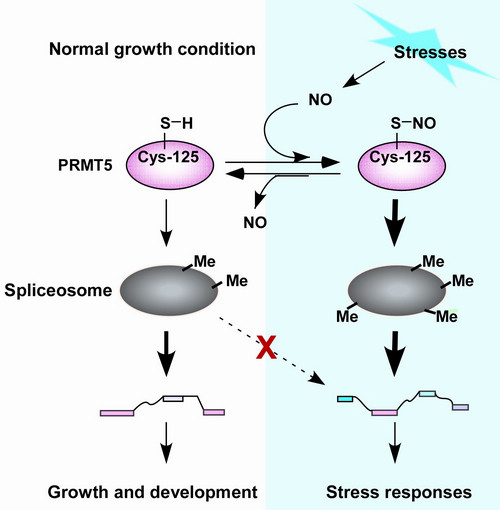Methylation and nitric oxide (NO)-based S-nitrosylation are highly conserved protein posttranslational modifications that regulate diverse biological processes, including the abiotic stress responses. However, little is known about the underpinning molecular mechanisms.
Dr. ZUO Jianru’s group at the Institute of Genetics and Developmental Biology (IGDB), Chinese Academy of Sciences, identified PRMT5, a protein arginine methyltransferase, as an S-nitrosylated protein in a nitroproteomics study in Arabidopsis. PRMT5 is a highly conserved enzyme that catalyzes arginine symmetric dimethylation of various proteins, including key components of the spliceosome.
In subsequent studies, in collaboration with groups of CAO Xiaofeng (IGDB), BAO Shilai (IGDB), and KONG Zhaosheng (Institute of Microbiology), They discovered that NO positively regulates the methyltransferase activity of PRMT5 through S-nitrosylation at Cys-125 in response to abiotic stresses.
Consequently, S-nitrosylation at Cys-125 of PRMT5 enhances arginine symmetric dimethylation, leading to proper splicing-specific pre-mRNA of stress-related genes and eventually boosting the tolerance to stresses. Importantly, S-nitrosylation at Cys-125 is essential for PRMT5-regulated stress responses mediated by NO.
These findings define a molecular link through which plants transduce stress-triggered NO signal to protein methylation machinery in response to environmental alterations.
A paper, entitled “Nitric oxide regulates protein methylation during stress responses in plants” describing these discoveries, was recently published online in Molecular Cell.
This study was supported by grants from the National Natural Science Foundation of China, the Strategic Priority Research Program of Chinese Academy of Sciences, State Key Laboratory of Plant Genomics, and a postdoctoral fellowship from China Postdoctoral Science Foundation and Chinese Academy of Sciences.
 |
|
A proposed model of the NO-mediatedS-nitrosylation of PRMT5 regulates stress responses (Image by IGDB) |
Contact:
Dr. ZUO Jianru
Institute of Genetics and Developmental Biology, Chinese Academy of Sciences



